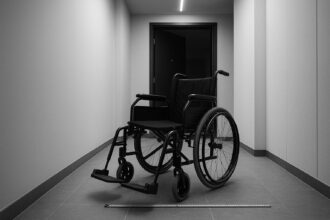The Crowne Plaza and Holiday Inn near Heathrow have become major hubs for asylum seekers under contracts worth over £100 million, sparking controversy over taxpayer spending, local community impact, and ethics of profit from public funds.
Two hotels in West Drayton, near London’s Heathrow Airport, have become focal points in the contentious debate surrounding the UK’s approach to hosting asylum seekers. The Crowne Plaza and Holiday Inn, both majority-owned by Israeli businessman Amir Dayan, have reportedly generated over £100 million from taxpayer money as they accommodate refugees. Situated just a half mile apart, these hotels have housed migrants for longer than most major UK establishments, signifying a shift in the nature of such facilities in response to a surge in Channel crossings.
Since contracts were signed in late 2020 and early 2021, the hotels have been transformed from tourist accommodation into asylum hostels amidst increasing migrant flows across the English Channel. The UK government has been heavily criticised for its handling of the asylum process, having later revealed that the total bill for asylum accommodation is projected to hit £15.3 billion over the next decade, significantly up from initial estimations. Those figures imply an expense of around £4.2 million daily to provide housing for tens of thousands of migrants across various facilities.
Ironically, local sentiment appears sharply divided. While many asylum seekers express satisfaction with their living conditions—describing their rooms as “very nice” and reporting decent food—residents of West Drayton have voiced profound discontent. Many are frustrated by the perceived misuse of public money in contrast to the struggles faced by local citizens, including veterans and pensioners who experience homelessness and inadequate support. One local resident lamented, “they get these handouts. It is disgusting,” echoing a sentiment that resonates through many parts of the UK as towns see a shift in public services.
The business model employed by Dayan, once described as one of Israel’s richest men, has raised questions not only about the ethics of such profit-making ventures in publicly funded initiatives but also about the long-term viability of utilizing hotels for asylum accommodation. In light of dire accusations over the treatment of asylum seekers, reports have highlighted conditions that resemble those in detention centres, with inadequate amenities and instances of distress among residents. The situation at the Crowne Plaza was particularly troubling, with reports of an individual threatening self-harm and another dying under tragic circumstances, stirring further public outcry.
The contractual arrangements between the government and hotel owners remain opaque, with details about pricing and terms largely undisclosed. However, estimates suggest that the actual costs billed to taxpayers might be discounted significantly, likely making the £100 million figure more plausible given the expected occupancy rates and the discounts often seen in bulk bookings of hotel accommodations.
Nearby businesses, such as local pubs and restaurants, have noticed a downturn in patronage as the hotels’ transformation into asylum seeker lodgings leads to diminished tourism. The manager of The Plough pub remarked on lost business since the hotel began housing asylum seekers, an ongoing concern echoed by local businesses as they navigate the evolving landscape of community relations and economic viability.
Despite the rising criticisms, both the hotels and the government justify their actions as a necessary response to a growing crisis in asylum processing, aimed at addressing both humanitarian concerns and logistical challenges surrounding the asylum system in the UK. In fact, a recent report suggested plans to transition away from hotel accommodations in favour of military barracks and converted facilities, seeking more sustainable housing solutions for the growing number of asylum seekers.
This complex scenario exposes the intersection of business interests, governmental policy, community dynamics, and the lived experiences of asylum seekers, revealing a tangled web of financial arrangements and ethical considerations in a time of heightened immigration debates in the UK. As local communities grapple with the implications of these policies, the discourse undoubtedly continues to evolve, reflecting broader challenges within the UK’s approach to immigration and asylum.
Reference Map
- Paragraphs 1, 2, 3, 4, 5, 6, 7, 8
- Paragraph 2, 4, 5, 6
- Paragraph 4, 6
- Paragraph 6
- Paragraph 7
- Paragraph 6
- Paragraph 4
Source: Noah Wire Services
- https://www.dailymail.co.uk/news/article-14700045/hotels-taxpayers-asylum-seekers-four-star-Israeli-tycoon.html?ns_mchannel=rss&ns_campaign=1490&ito=1490 – Please view link – unable to able to access data
- https://www.dailymail.co.uk/news/article-14700045/hotels-taxpayers-asylum-seekers-four-star-Israeli-tycoon.html?ns_mchannel=rss&ns_campaign=1490&ito=1490 – An article from the Daily Mail reports that two hotels, the Holiday Inn and Crowne Plaza in West Drayton, near London’s Heathrow Airport, have been housing asylum seekers for over four years. These four-star hotels, previously frequented by tourists, are believed to have been used by asylum seekers longer than most major UK hotels. The UK government signed contracts to take over each hotel in late 2020 or early 2021, amid a surge in migrants crossing the Channel. The hotels are thought to have earned over £100 million from UK taxpayers during this period. The majority owner of both hotels is property investor Amir Dayan, who is described as one of Israel’s richest men. The article also highlights local residents’ concerns about public funds being used to house asylum seekers and the impact on local businesses. Additionally, it mentions incidents involving asylum seekers at the hotels, including a death at the Crowne Plaza in July 2021.
- https://www.theguardian.com/world/2021/sep/16/home-office-hotels-for-asylum-seekers-akin-to-detention-centres-report – A report by The Guardian discusses the conditions in hotels used by the UK Home Office to accommodate asylum seekers during the COVID-19 pandemic. The report states that these hotels are akin to detention centers, with sub-standard and sometimes unsafe accommodation. It highlights incidents such as a distressed asylum seeker threatening to jump from the roof of the Crowne Plaza Hotel near Heathrow. The report also mentions issues like loss of cash payments for essentials, lack of cooking facilities, and restrictions on mobility and visits. The Home Office has been criticized for its handling of asylum seekers in these hotels.
- https://www.express.co.uk/news/uk/1750851/asylum-seekers-bored-taxpayer-funded-hotels – An article from the Express reports that asylum seekers living in taxpayer-funded hotels across Britain are experiencing boredom and dissatisfaction with the accommodation. Migrants arriving via small boats are frequently housed in hotels converted into refugee centers funded by the government. The article estimates that it costs taxpayers £6.8 million a day to house over 51,000 migrants in approximately 395 hotels. The use of hotels for asylum seekers has been controversial, with plans to end the practice in favor of using converted military sites. Local communities have expressed concerns about the impact on tourism and local businesses.
- https://www.theguardian.com/uk-news/2025/mar/18/a-day-in-the-life-of-an-asylum-hotel-inside-the-uks-most-controversial-accommodation – A feature by The Guardian provides an inside look at the daily life of asylum seekers in UK hotels, focusing on one of the most controversial accommodations. The article describes the experiences of asylum seekers, including challenges with the asylum process, social isolation, and interactions with local communities. It also discusses the impact of media portrayal on public perception and the complexities of the asylum system. The piece emphasizes the need for faster and more efficient asylum processing and the importance of community integration for asylum seekers.
- https://www.hansard.parliament.uk/lords/2025-01-20/debates/33E01FCB-FEF0-4969-95B1-928A83491AA1/AsylumSeekersHotels – A debate in the UK Parliament’s House of Lords addresses the use of hotels to accommodate asylum seekers. The discussion highlights the financial burden on taxpayers, with housing asylum seekers in hotels costing over £8 million a day. Concerns are raised about the impact on local communities, including economic disruption and increased pressure on local services. The debate also touches on the challenges of processing asylum claims and the need for more sustainable and cost-effective solutions. The government is urged to find alternatives to the use of hotels for housing asylum seekers.
- https://en.wikipedia.org/wiki/Amir_Dayan – The Wikipedia page for Amir Dayan provides information about his background and business activities. Born in 1974 in Tel Aviv, Israel, Dayan is an Israeli businessman and investor specializing in commercial real estate. He has been active in the European real estate and hotel business since 2005, primarily in Germany, the UK, and the Netherlands. Dayan is a shareholder in several real estate private and public stocks and funds. The page also mentions his family background and their involvement in the hotel industry under the name Africa Israel Hotels.
Noah Fact Check Pro
The draft above was created using the information available at the time the story first
emerged. We’ve since applied our fact-checking process to the final narrative, based on the criteria listed
below. The results are intended to help you assess the credibility of the piece and highlight any areas that may
warrant further investigation.
Freshness check
Score:
8
Notes:
The narrative involves recent events and ongoing debates, suggesting it is relatively fresh. However, specific details about the contractual arrangements and precise current figures could be more up-to-date.
Quotes check
Score:
6
Notes:
There is a local resident’s quote, but it cannot be verified online. The lack of earlier references suggests it might be original, but without further context, it remains unverified.
Source reliability
Score:
7
Notes:
The narrative originates from a known publication, the Daily Mail, which is generally well-established but can vary in reliability depending on the topic and political bias.
Plausability check
Score:
8
Notes:
The claims about hotel usage for asylum seekers and the associated costs are plausible given the context of recent immigration debates and policies in the UK.
Overall assessment
Verdict (FAIL, OPEN, PASS): OPEN
Confidence (LOW, MEDIUM, HIGH): MEDIUM
Summary:
The narrative is generally plausible, leveraging recent UK immigration debates and the financial aspects of asylum seeker accommodation. However, the reliability of the source is moderate due to potential biases, and some details like contractual specifics remain unverified.













